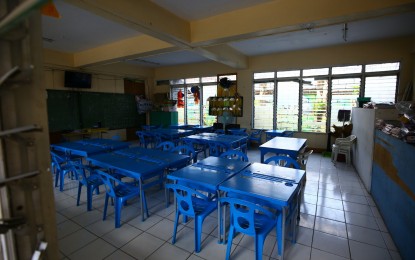
HEAT IS REAL. The Pinyahan Elementary School in Diliman, Quezon City cancels face-to-face classes on Tuesday (April 2, 2024). The city is among the local government units that adopted alternative delivery modes as scorching temperatures take a toll on learners. (PNA photo by Joan Bondoc)
MANILA – More areas have resorted to alternative learning modes (ADM) due to sweltering temperatures, the Department of Education (DepEd) said Tuesday.
As of 9 a.m., suspension of face-to-face classes from preschool to senior high school, both for private and public schools, has been implemented in Quezon City and Caloocan City.
The same was implemented in Dagupan City in Ilocos Region; Polangui, Albay in Bicol Region; cities of Iloilo, Kabankalan, Silay, Himamaylan, and Bago, as well as Bacolod, Negros Occidental, and Roxas City in Western Visayas, the DepEd said in an advisory.
Three schools in Eastern Visayas and the Zamboanga Peninsula also ordered blended learning, particularly Maasin Central School in Maasin City; and Pagadian City Pilot School and Buenavista Integrated School, respectively.
Likewise, the local government units of Banga, Tantangan, General Santos, and Polomolok in South Cotabato, Sultan Kudarat, and Maasim in Sarangani implemented suspended in-person setups for learners and teachers.
Adjusted schedules
The Navotas City Schools Division Office, meanwhile, adjusted the class schedules in public schools, freeing schools of all students during the highest heat index peaks from 10 a.m. to 2 p.m.
For the morning shift, classes will run from 6 a.m. to 10 a.m.; while the afternoon shift will resume from 2 p.m. to 6 p.m. for elementary levels and 2 p.m. to 7 p.m. for secondary levels.
For all public schools in Muntinlupa, Mayor Ruffy Biazon announced the shortening of in-person classes until 10 a.m., with afternoon classes suspended due to the extreme heat.
Meanwhile, the Division of City Schools in Manila has given school heads the discretion to suspend face-to-face classes amid hot weather conditions.
In a memorandum, Dr. Nerissa Roxas Lomeda, Chief Education Supervisor and Office of the Superintendent officer-in-charge, said in-person classes “must, at all times, be the default modality, except in extreme cases”.
“While School Principals have the authority over Class programming, you are reminded of your accountability with learning outcomes,” she added.
Lomeda said teachers and students can wear more comfortable clothing aside from their regular uniforms to reduce the heat they feel while inside the schools.
However, she said these outfits must adhere to the Civil Service Commission’s rules on appropriate clothing in the workplace.
The memorandum, meanwhile, enjoined all schools to submit implementation plans to their assigned public school district supervisors for information, monitoring, and supervision of classes.
On Monday, around 13 areas nationwide shifted to blended learning due to scorching heat index levels.
The Task Force El Niño, earlier, urged local government units to consider a shift to ADM to ensure that the welfare of learners and teachers is not compromised.
DepEd Ilocos Norte allows shifting to distance learning
DepEd-Ilocos Norte Schools Division Superintendent Donato Balderas Jr. said that before changing class schedules and modalities, the province’s school officials are required to submit proposals or recommendations.
San Nicolas National High School shifted to distance learning, using printed and digitized modules, activity sheets, and online platforms.
Other schools required their learners to bring water containers and drink every 9 a.m., 11 a.m. and 2 p.m.
On the other hand, newly constructed classrooms at the Ilocos Norte National High School in Laoag City have been installed with air-conditioning units through the initiative of parents-teachers associations.
“Our children deserve the best education and a convenient space for learning,” Noel Abad, father of a Grade 10 student, said. (with Ferdinand Patinio/Leilani Adriano/PNA)
